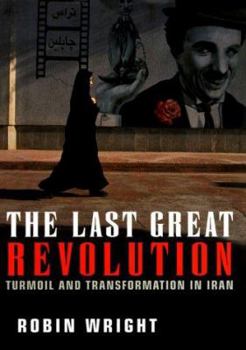The Last Great Revolution: Turmoil and Transformation in Iran
Select Format
Select Condition 
Book Overview
Acclaimed journalist Robin Wright meticulously describes the ongoing transformation of Iranian society, politics and religion that ranges from the empowerment of women to the blossoming of a movie... This description may be from another edition of this product.
Format:Hardcover
Language:English
ISBN:0375406395
ISBN13:9780375406393
Release Date:January 2000
Publisher:Alfred A. Knopf
Length:368 Pages
Weight:2.35 lbs.
Dimensions:1.3" x 6.6" x 9.5"
Customer Reviews
4 ratings
your own "trip" to Iran by reading this book
Published by Thriftbooks.com User , 24 years ago
The Last Great Revolution by Robin Wright is a must read for anyone interested or curious about the "aftermath" of the Iranian revolution. For those who have not been back to Iran since the revolution, or for those who would like to understand a culture so complex and rich, this book documents the social climate of the past twenty years in Iran. I could not put the book down. Living in the states for most of my life, yet visting Iran every so often: as I turned each page, I felt like it was another day I was living in Iran. By reading this, I heard the traffic, I felt the heat through my chador, and I also saw the struggles the Iranians go through daily. In addition to stating the drawbacks to the Islamic revolution, more importantly, Wright establishes an intriguing twist to the stereotypical image of Iran. She does so by praising the "births" of the many sub-movements, ie. Iranian cinema, education, women's rights. Although, Iran has a long way to go in many aspects, it was encouraging to read about the numerous accomplishments Iranians have made by transforming the theocratic restrictions into positive change.
Insightful view of complex country
Published by Thriftbooks.com User , 24 years ago
From political leaders and dissidents to film makers, philosophers, housewives and teenagers, journalist Robin Wright conveys the outspoken voices of Iran in this timely study.Readable and well-organized, Wright's book illuminates the impact of the 1979 revolution on ordinary citizens today as well as examining the root causes. She naturally focuses on Iranian/U.S. relations, explaining the long-festering feeling against the 1953 US/British-engineered coup that reinstalled the Shah's repressive regime. She shows how Ayatollah Khomeini seized on the almost whimsical takeover of the US embassy in 1979 to divert attention from domestic troubles and unite his people in heightened revolutionary fervor.Iranians view the American people and their government separately and always have, Wright claims. At a 1999 demonstration, an Islamic clerical leader takes Wright aside. "'We shout death to policies, not to the scientists and thinkers of America,' he said, as if the difference were obvious and I had to be daft not to understand." One of the more outspoken of the original hostage takers addresses the crowd. " 'Today we invite all the hostages to return to Iran as our guests....Regarding relations with America, we must look to the future and not to the past.' "The skeptical reader is reminded of terrorist attacks against ordinary civilians and the impossibility of American tourism in Iran, at least during the '80s. But, as Wright points out, the population of Iran has nearly doubled since the revolution, meaning nearly half of Iranians were born during Islamic reign. Things are different for them.Comparing the classic stages of revolution to a fever - raging, convalescing and recovery, Wright traces events leading to revolution and the formation of a religious government (which even Khomeini did not originally intend) through a clerical reign of terror which "eliminated former partners - leftists, nationalist and intellectuals - from any claim to power."Convalescence did not begin until the end of the Iran/Iraq war and Khomeini's death in 1989. While the clergy tightened their hold on power by opposing any relaxation of conservative Islamic strictures, people began to chafe for more freedom and dissidents, many of them former revolutionary heroes, clamored for more democracy. A joke making the rounds in 1992 called on Ayatollah Khomeini to describe paradise, which he does in terms of plenty of food, many pleasures, no tension. " 'So how would you characterize paradise?'... 'Well,' said Khomeini, 'it's very much like the time of the shah.'" But Wright is careful to make clear that nostalgia is not for the shah himself but for a time of prosperity and international importance.The bulk of the book focuses on the "Islamic Reformation," epitomized by clerics like current president Mohammed Khatami whose philosophical leanings tend toward democracy. As government influences every aspect of daily life, Wright interviews p
Good commentary without judging
Published by Thriftbooks.com User , 24 years ago
Having lived in Iran and subesquently devoured as many books as I can on the subject, I found this book to be as objective a commentary on Iran as much as an individual can - or perhaps just matched my perspective on Iran
Thorough social and political analysis
Published by Thriftbooks.com User , 24 years ago
Robin Wright has given us yet another superb analysis of the social and political scene in contemporary Iran. I only with that she had had a more thorough discussion the role of the Kurdish and Afghan refugees and their impact on the Iranian society.





